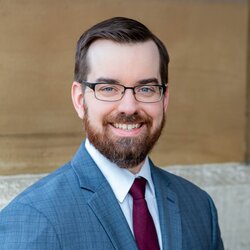
STAFF ATTORNEY
Phone: 515-244-1194 x 211
Email: schmidt@iaenvironment.org
Michael Schmidt joined the Council in 2019 and works across IEC's program areas. He most recently worked as a staff attorney for the Minnesota Pollution Control Agency, where he focused on clean water and mining issues through enforcement, permitting, and rulemaking actions. He previously worked for the Minnesota Center for Environmental Advocacy, a state-based nonprofit, where he engaged in legal, legislative, and policy advocacy on water quality issues. He has a law degree from the University of Minnesota and a B.A. in political science from the University of Iowa.
Blog posts by this Author:
-
Saving Swampbuster to Strengthen Iowa
Agricultural runoff contributes the vast majority of nutrient pollution to Iowa's waters, in part because there are few restrictions on it. One of the few conditions in place is a provision adopted in the 1985 Farm Bill called Swampbuster, which conditions federal subsidies on protecting wetlands from agricultural development. This longstanding provision has discouraged destruction of Iowa's few remaining wetlands. But what if that protection were revoked? Read on to learn more.
-
Measuring Tile Drainage in Iowa
Although recent rains have brought Iowa out of drought, they also led to flooding and significant increases in nitrate loads to surface waters - the same nitrate leading to a dead zone in the Gulf of Mexico the size of New Jersey. Tile drainage, the underground piping in cropland, has contributed to the flow of nitrate from fertilizer and manure. Read on to learn more.
-
When politics prevent water protections
As a statewide organization, most of IEC's work focuses on state actions - but sometimes, the state is unwilling to do what needs to be done. In April, the state Environmental Protection Commission adopted rules for animal feeding operations that did not include protections that DNR itself identified were necessary. Read on to learn about our responses.
-
New coal ash regulations protect Iowans from toxic water pollution
New EPA regulations on coal ash will have an immediate impact in Iowa. On May 3rd, IEC submitted public comments on a draft permit that proposed to allow discharges of coal ash leachate upstream from the drinking water intake for Ottumwa.
-
EPA opts for meetings rather than changes to CAFO rules
The EPA recently denied two petitions seeking stronger rules governing concentrated animal feeding operations (CAFOs) filed by national and local environmental groups. IEC Staff Attorney Michael Schmidt explains the petitions, the ruling, and what it means for future CAFO rules in Iowa.
-
Feedlot Rule Update: Round 2 of Many
Iowa DNR is in the process of updating the rules defining how manure is stored at AFOs and then applied on the landscape. This rulemaking is a chance for DNR to protect Iowans while saving them money, but we need stronger rules to make that happen. The draft rules have some changes, but not enough - and the process is more complicated thanks to an executive order.
-
Staff Insights: Michael Schmidt on Iowa's Sustainable Future
IEC Staff Attorney Michael Schmidt shares his story about growing up in Iowa, his years living in Minnesota, and coming home to become involved with environmental work through law school, family, and the wonder of the great outdoors.
-
How to save Iowans billions and reduce CO2 by 90%
The Iowa Utilities Board has a stark question before it: should it put customers' needs first and require MidAmerican to take action that can save customers as much as $5 billion dollars and reduce CO2 emissions by 90 percent?
-
A New Foray Into Community Solar in Eastern Iowa
Alliant Energy will build its first Iowa community solar project in Cedar Rapids. IEC Staff Attorney Michael Schmidt shares IEC's position on Alliant's new program and what it means for area residents.
-
Where's the Beef? Near Outstanding Iowa Waters.
Supreme Beef is in the watershed of Bloody Run Creek, a trout stream designated by the DNR as an Outstanding Iowa Water in a unique Iowa landscape. That unique topography means the manure produced by the facility will likely harm the creek, and will likely strip Bloody Run Creek of that special designation.
See All Authors